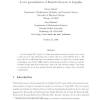Free Online Productivity Tools
i2Speak
i2Symbol
i2OCR
iTex2Img
iWeb2Print
iWeb2Shot
i2Type
iPdf2Split
iPdf2Merge
i2Bopomofo
i2Arabic
i2Style
i2Image
i2PDF
iLatex2Rtf
Sci2ools
JCT
2007
2007
A new generalization of Mantel's theorem to k-graphs
Let the k-graph Fank consist of k edges that pairwise intersect exactly in one vertex x, plus one more edge intersecting each of these edges in a vertex different from x. We prove that, for n sufficiently large, the maximum number of edges in an n-vertex k-graph containing no copy of Fank is k i=1 n+i−1 k , which equals the number of edges in a complete k-partite k-graph with almost equal parts. This is the only extremal example. This result is a special case of our more general theorem that applies to a larger class of excluded configurations.
| Added | 15 Dec 2010 |
| Updated | 15 Dec 2010 |
| Type | Journal |
| Year | 2007 |
| Where | JCT |
| Authors | Dhruv Mubayi, Oleg Pikhurko |
Comments (0)

